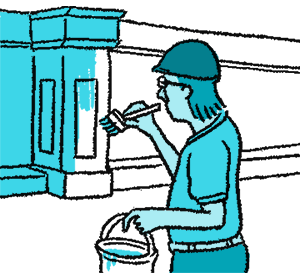Preservation Special Projects
The people and organizations preserving our historic places take on all kinds of challenges, from advocacy to long-term stewardship planning. Preservation Special Projects grants pave the way to a built environment that is valued and protected.
These guidelines reflect information for last year’s grant cycle and will be updated ahead of applications opening for the next cycle. Please contact 4Culture staff with any questions.
Steps to Apply
1
What Preservation Special Projects Funds
1
What Preservation Special Projects Funds
 This grant funds research, documentation, planning, education, and advocacy to promote the preservation of historic places in King County, Washington. It is open to individuals, groups, and municipalities. Funds may be used to create printed or digital resources such as research reports, building or landscape assessments, landmark nominations, books, guides, brochures, recordings, or educational exhibits focused on the historic built environment. Funding may also be used to produce special events and programs that highlight our region’s historic places and encourage their preservation, such as advocacy initiatives, conferences, workshops, technical assistance programs, apprenticeship or training opportunities, guided tours, field schools and skill demonstrations.
This grant funds research, documentation, planning, education, and advocacy to promote the preservation of historic places in King County, Washington. It is open to individuals, groups, and municipalities. Funds may be used to create printed or digital resources such as research reports, building or landscape assessments, landmark nominations, books, guides, brochures, recordings, or educational exhibits focused on the historic built environment. Funding may also be used to produce special events and programs that highlight our region’s historic places and encourage their preservation, such as advocacy initiatives, conferences, workshops, technical assistance programs, apprenticeship or training opportunities, guided tours, field schools and skill demonstrations.
In 2023, 13 projects received funding, totaling $92,000 in support of historic preservation projects throughout King County. In 2025, approximately $270,000 are available for Preservation Special Projects awards. Awards typically range from $2,000 to $15,000.
Criteria
We award this grant through a competitive process, carefully evaluating each application. We want to see that you have a good plan behind your project, and that you’re exploring and sharing historic preservation in a tangible way.
For this particular grant, we’ll look to see how well your project shows the following:
- Quality: your project directly addresses historic buildings or structures, older neighborhoods, or landscapes shaped by people. Your project aligns with best practices in historic preservation or shows innovation within the field. Your application is clear and complete.
- Public benefit: your project contributes to the preservation of King County’s historic buildings, sites, neighborhoods, or landscapes. Your project provides compelling and feasible public benefit for residents and visitors of King County. Your project has the potential to expand the public’s understanding and awareness of historic places in the county and/or highlights historic places in innovative ways, and makes clear efforts to be accessible to many ages, disabilities, languages, and communities. Your project focuses on the long-term preservation and stewardship of one or more important historic resources.
- Advancing Equity: 4Culture’s mission focuses on racial equity and envisions a county where culture is essential and accessible to all. Your project specifically serves or collaborates with communities of color and/or historically marginalized communities. This is not an eligibility requirement for funding, but it is one of the factors the panel will consider.
- Feasibility: you are able to start your project soon after award notification and complete the project within 24 months as demonstrated through a realistic budget, prepared project team, and ability to complete the project on a reimbursement basis.
Public Benefit: Why It Matters
Every time a visitor to King County stays in a hotel, they pay a Lodging Tax—this is where our funding comes from, and our mission is to put it back into the community. In your application, tell us exactly how your fellow King County residents will be able to enjoy and learn from your work. Read about public benefit in more depth here.
Here are some ways Preservation Special Projects may benefit the public:
- Free or low-cost tours, presentations, or access to materials and documents created with the grant including research, publications, audio, or video recordings.
- Public meetings or programs in multiple places around King County, including a mix of urban, suburban and/or rural.
- Good preservation planning for the long-term viability and use of a historic property in King County.
Equity Investments
In order to combat inequities in our grantmaking, 4Culture has implemented Equity Investments. This practice incorporates indicators of structural inequity into our panel process, including geographic location, income, operating budget, audiences served, and project focus. By prioritizing these factors, we intend to more equitably distribute funds to communities that have historically been excluded from cultural funding.
Each of our grant programs implements an Equity Investment system tailored to the specific needs of its applicants; please read the After You Submit section of this page for details on how Equity Investments will function for this grant. This organization-wide practice—and what we learn about its impact—is an important step towards more equitable funding at 4Culture and throughout the King County cultural sector.
2
Are You and Your Project Eligible?
2
Are You and Your Project Eligible?
You
- Individuals, organizations, community groups, or unincorporated or fiscally sponsored groups, located and operating in King County, may apply.
- Individual applicants must be at least 18 years old and a resident of King County, Washington.
- Organizations that receive 4Culture Sustained Support in 2025 are not eligible to apply.
- Individual applicants cannot represent or apply on behalf of ineligible entities; please contact Program Manager Emily P. Lawsin at if you have eligibility questions.
- If you receive funding, individuals will need to provide us with your Social Security number in order to receive payment. Organizations, community groups, and public agencies must operate within King County, and will need to provide us with a Tax ID or EIN in order to receive payment.
- You must contact Program Manager Emily P. Lawsin at prior to applying if you or your group or organization has an open contract with 4Culture.
- You may only submit one project proposal to Preservation Special Projects per year.
- You must be able to complete your project on a reimbursement basis.
- Current 4Culture staff, 4Culture Board members, or Advisory Committee members may not apply as an individual.
- Current employees, family members, or business partners of an employee of 4Culture may not apply.
- We do not fund schools or school districts. However, eligible applicants proposing the creation or enrichment of existing cultural programs in K-12 schools must partner with a King County public school or district.
Your Project
- Your project must contribute to the preservation of King County’s historic buildings, sites, neighborhoods, and/or landscapes.
- You can request funding to develop documentation, identification, research, analysis, landmark nominations, educational programming, and advocacy efforts focused on historic preservation issues and/or the history of the built environment.
- Your project must be accessible to and provide a public benefit for King County residents and visitors.
- Projects funded through this program, or portions thereof, may not begin prior to the award date of May 28, 2025, and must be completed by June 1, 2027.
- This grant may not be used for construction costs related to the stabilization, restoration, rehabilitation, or maintenance of historic buildings or landscapes, property acquisition, or new construction. (Please see Landmarks Capital or Building for Equity for those grants.)
- This grant may not be used to support services and programs to be provided by the King County landmarks commission for land use regulation and archaeological resource management purposes as described in K.C.C. chapter 20.62. (Ord. 18684 § 16, 2018: Ord. 17461 § 3, 2012: Ord. 14917 § 1, 2004: Ord. 14482 § 43, 2002: Ord. 14440 § 3, 2002. Formerly K.C.C. 4.42.025).
- If your project involves multiple disciplines—historic preservation, heritage, and/or the arts—it may be eligible for consideration under more than one 4Culture projects funding program. You may request funding for different elements of your project through the separate funding programs but must disclose in your application what other 4Culture funding you have requested, or will request. Contact Emily P. Lawsin at to discuss your project’s eligibility before applying.
3
Helping You Succeed
3
Helping You Succeed
 Workshops
Workshops
Workshops can make a real difference in the success of your application. They’re an opportunity for you to get your questions answered by a 4Culture grant manager and learn from other applicants. If you’re unable to attend, a workshop recording is available below.
For virtual workshops, please register via the links provided to receive Zoom meeting information. The workshops on Tuesday, February 4, and Wednesday, February 12, 2025, will be held in-person as drop-in sessions. All grant managers of Art, Heritage, and Preservation Special Projects will be present to answer your questions. You do not need to register for these sessions.
Note: February 11 will be a panel discussion with Preservation Special Projects recipients, followed by a King County Quarterly Regional Preservation Training co-sponsored by 4Culture, Historic Seattle, and King County Historic Preservation Program. February 26 (in-person) and March 3 (virtual) will be drop-in Office Hours sessions; while there will be no formal presentation, the grant manager will be on hand to answer any questions ahead of the March 12 application deadline.
Resources
Application Guide
Watch this step-by-step application guide video to assist you in the application process.
Worksheet
As you work on your application, you may choose to work offline in a document. This application Worksheet can be used as tool as you work. It includes helpful tips and space to draft your responses. This worksheet is not a substitute for submitting your application via the online portal and will not be accepted as your application. If you use the worksheet, you must copy the answers from your worksheet into the online application form before the deadline.
Click to download the worksheet: Word | PDF
Sample Application
Read sample applications A and B that successfully received funding in previous years. View a listing of all funded projects from the last 3 years on our Past Grants page.
Personal Support
We are also happy to review draft applications and provide feedback with adequate notice. For full draft reviews, save your work in the online application and contact Emily P. Lawsin at no later than Friday, February 28. After that date, we cannot review full drafts but will still be available to assist with specific questions and/or troubleshooting.
Contact
For technical support:
Lauren Miles
206-263-3210
Translation and Assistance
The guidelines, a detailed explanation of how to apply, and the application are in English. If this is a barrier that stops you from understanding the grant or applying due to limited English writing ability, visual impairment, or you would like to request assistance to create an application, please contact or call (206) 296-7580 or TTY 711, and we will make sure you get the support you need. More ›
中文 (Chinese)
详细说明如何申请的指南以及申请本身均使用英文。如果由于英语写作能力有限、视力障碍而妨碍您对本资助的了解或申请,或者您希望请求协助来完成申请,请发送电子邮件至 或致电 (206) 296-7580 或 TTY (听障专线) 711 联系,我们会确保您获得所需的支持。了解更多相关信息 ›
Русский (Russian)
Руководство, подробная инструкция и форма заявки на английском языке. Если вам сложно разобраться в процедуре получения грантов или подачи заявок из-за ограниченных навыков письменного английского языка либо нарушений зрения, а также если вы бы хотели обратиться за помощью при составлении заявки, отправьте письмо на адрес электронной почты или позвоните по номеру (206) 296-7580 или 711 (телетайп), и мы позаботимся о том, чтобы вы получили необходимую помощь. Дополнительная информация ›
Soomaali (Somali)
Tilmaamaha, sharaxaadda faahfaahsan ee ku saabsan sida loo codsado, iyo waraaqda codsiga waxa ay dhammaan ku qoran yihiin Af-Ingiriisi. Haddii ay arrintani tahay caqabad kaa hor istaageysa fahamka deeqda ama codsashada oo ay sabab u tahay awoodda qorista Af-Ingiriisiga oo xadidan, araggaaga oo liita, ama aad jeclaan lahayd inaad codsato in lagaa caawiyo in aad codsi sameyso, fadlan la xiriir ama wac (206) 296-7580 ama TTY 711, waxaana xaqiijin doonnaa inaad hesho taageerada aad u baahan tahay. Xog badan ka ogow ›
Español (Spanish)
Las pautas, la explicación detallada de cómo enviar la solicitud y la solicitud están en inglés. Si esto le impide comprender la información relacionada con la beca o enviar una solicitud debido a una limitación en la capacidad para escribir en inglés, si tiene una discapacidad visual o si desea recibir asistencia para crear una solicitud, escriba a o llame al (206) 296-7580 o TTY 711, y nos aseguraremos de que obtenga la ayuda que necesita. Más información ›
Tiếng Việt (Vietnamese)
Hướng dẫn, giải thích chi tiết về cách nộp đơn va tài liệu áp dụng tất cả đều bằng Tiếng Anh. Nếu đây là rào cản khiến quý vị không hiểu được khoản trợ cấp hoặc cách nộp đơn do khả năng viết tiếng Anh hạn chế, do quý vị bị suy giảm thị lực hoặc muốn yêu cầu hỗ trợ để tạo đơn đăng ký, làm ơn liên hệ hoặc gọi (206) 296-7580 hay TTY 711 và chúng tôi sẽ hỗ trợ những gì quý vị cần. Để biết thêm chi tiết ›
4
After You Submit
4
After You Submit
 Timeline
Timeline
The deadline for this grant is Wednesday, March 12, 2025, by 5:00 PM PDT. All applicants will receive an email from Program Manager, Emily P. Lawsin, notifying them of the funding decisions by June 1, 2025. Please note, your project may be underway before applying, but you must not have started work on the portion of the project you are requesting funding for earlier than May 28, 2025. If you are awarded funds, you must complete the project or portion funded by this grant by June 1, 2027.
Selection Process
4Culture Program Managers first review all applications to ensure eligibility. We then facilitate a panel of historic preservation specialists and community members, which changes annually, to evaluate all eligible applications. The panel, not staff, selects and recommends the most compelling projects for funding based on the criteria outlined above.
The Equity Investment for this program is a dollar amount added to the proposed award for projects that are based in an Equity Investment area or that score an average of 5 out of 5 on the Advancing Equity criterion. Projects may qualify as being in an Equity Investment area by meeting one or more of the following requirements. You do not need to meet one of these to receive a grant; these only give certain projects priority for Equity Investment funds:
- You, or the historic resources that are the focus of your project, are outside of the City of Seattle.
- You, or the historic resources that are the focus of your project, are located in Seattle in a Communities of Opportunity area.
- Organizations with an annual budget over $3.5 million do not qualify for this additional Equity Investment funding.
The panel’s award recommendations are then sent to the Historic Preservation Advisory Committee for review, and then onto 4Culture’s Board for final approval. The entire process, from application deadline to final award notification, takes approximately two months.
Contracts and Payment
We provide grant funds on a reimbursement basis, after your project or portions of your project are complete. If the 4Culture Board approves your project for funding, your grant manager will work with you to create a contract outlining the scope and public benefit of your project based on your application, and a reimbursement schedule.
Requirements and Appeals
Learn about what will be required if you are awarded a grant, and about the process for appeal of a 4Culture decision.
5
Apply
5
Apply

All applications must be filled out online. Once you’ve started your application, you can save it as a draft and continue to work on it up to the deadline. Once you click Submit, your application is final. Please do not hesitate to contact us if you have any questions, or need assistance, at any time during the process.
What’s in the Application?
Your application must include all the following required materials listed here. We strongly recommend assembling them before you login and begin your application. We encourage you to call or email us with any questions as you work on these materials. The online application includes questions connected to the criteria for this grant, as well as a project budget. You must complete all required fields in the online form in order to submit your application for review. Read all the instructions carefully, answer all the questions as thoroughly as possible, and complete the project budget to the best of your ability. All application materials must be submitted through the online application.
Project Narrative
You will be asked to answer the following questions in the application narrative section:
- Project Description: what do you propose to do in your project? Your project must address King County’s historic buildings, sites, neighborhoods, and/or landscapes. Describe your proposed project, including dates, locations, and activities. What are your main objectives, and what will be the specific project outcomes? How does your project align with best practices in historic preservation or show innovation within the field? Why is the proposed project a priority at this time?
- Public Benefit: describe the project’s intended impact within the community. How will project activities contribute to the long-term preservation of the built environment (i.e. buildings, landscapes, structures, objects)? How will your project expand the public’s understanding and awareness of historic places, and/or highlight historic places in innovative ways? What resources, programs, or tangible products, or other types of public benefit will result from this project? How will you provide public access to them? (Please see the guidelines above for our definition of public benefit, and our webpage for examples.)
- Advancing Equity: does your project focus on inclusion of underrepresented communities within historic preservation? Will the project serve, benefit, engage and/or collaborate with communities of color and/or historically marginalized communities in King County? If so, please explain how? If not, you may simply state so.
- Feasibility: describe who will be managing the project; summarize their experience and/or interest in historic preservation. Projects funded through this program, or portions thereof, may not begin prior to the award date of May 28, 2025, and must be completed on a reimbursement basis. How do you intend to meet this requirement? If you do not receive the full amount requested through this program, how will your project change?
Project Budget
We use a comprehensive project budget for many of our grants. This may mean you will have costs for some fields in the budget, but not all. Use the budget form embedded in the application to record expected expenses and revenue for the project. Complete it to the best of your ability and for what makes sense for your project. Type whole numerical figures in the budget fields, and then use the budget notes field to explain those costs.
Consultant Estimate
You must submit at least one written estimate if your project will involve hiring a consulting historic preservationist, architect, historian or other professional.
Optional Materials
You may also provide images, letters of support, drawings, previous research, studies, images and audio/video clips, or reports to help illustrate your proposal. Optional support materials may be uploaded within the online application. Carefully read the upload requirements within the application for the different types of materials you choose to submit. Be selective—these are optional!
Demographic Information
In addition to your application, you must provide demographic information for the current year for yourself, and, if you are applying as an organization, for your board and staff (paid and unpaid). The form is separate from the application, but within the same apply website. You will access the demographic update form through the site under “Your Profile” section. We do not use this information to determine funding priorities or allocations. However, we do use this information to help us understand how well we are doing in our efforts to reach all communities across King County, Washington. We only require you to submit one update per year, so if you have already applied for a 4Culture grant this year and submitted a 2025 demographic update, you don’t need to submit another one for this grant. You must submit your Demographic Information by the application deadline: March 12, 2025.
Watch a tutorial video on how to complete your Individual or Organization’s demographic survey.
Substitulos en Español | 中文字幕(繁體)

